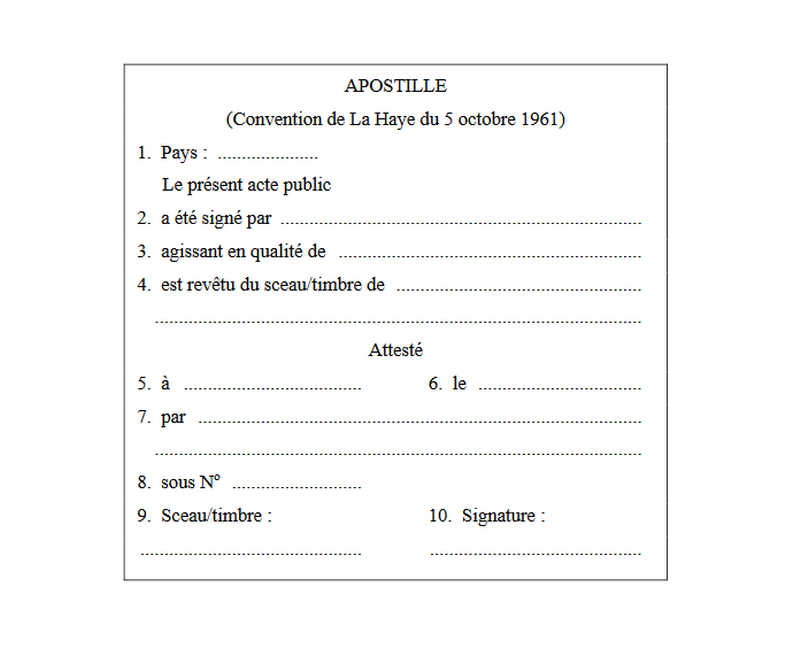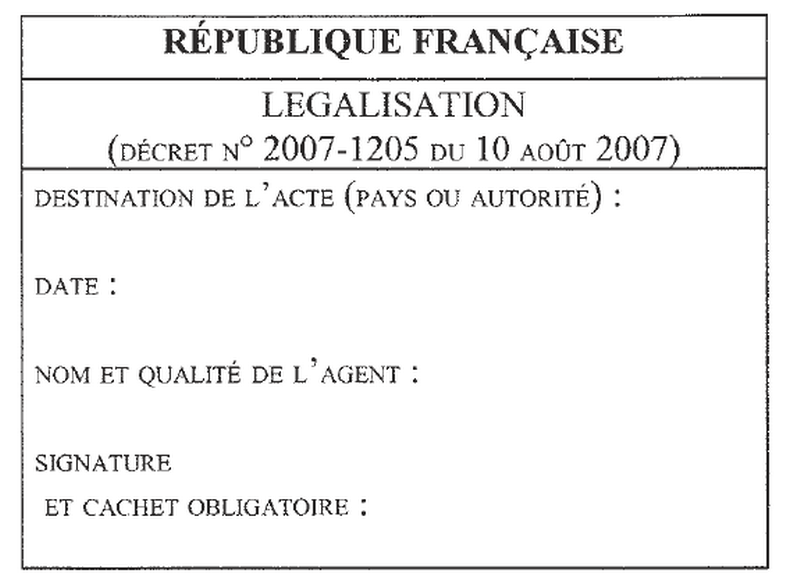Legalization or apostille of a public act drawn up by a French authority
Verified 26 April 2024 - Directorate for Legal and Administrative Information (Prime Minister)
Legalization and Apostille: Rule changes in 2025
Published on 23 May 2023
The rules for issuing the legalization and apostille of a public act drawn up by the French authorities will be amended from 1er january 2025.
That's what the orders in council provide n°2021-1205 of 17 september 2021 and n°2023-25 of 23 january 2023.
The information contained on this page remains current and will be modified on that date.
Should a French document be legalized or apostilled to make a overseas approach ? Which countries exempt from legalization and/or apostille some documents? What are the formalities for submitting a document? in a country the European Union ?
Here are the main rules to know about procedures for authenticating a signature affixed to a french public document intended to be presented to an authority of a foreigner country.
Warning
Legalization and the Apostille do not concern a French document intended for a French administration.
Step-by-step approach
To submit a French document to a foreign authority, prior authentication of the signature of the issuing authority may be required.
For example for an adoption procedure, a judicial procedure, sign a contract.
The legalization is the authentication procedure prior to the signature of the issuing authority.
The Apostille is a simplified procedure of legalization. It replaces legalization for the countries where it applies.
Legalization and the Apostille attest to the following information :
- Veracity of the signature
- Quality in which the signatory of the document acted
- If necessary, seal identity or stamp mentioned on the document
In practice, legalization and the apostille are a official stamp added to the document.
Legalization and the Apostille concern the French public acts intended to be presented to a authority of a foreigner country.
The following documents are considered as public acts :
- Act of a judicial or administrative court. For example, a judgment.
- Act of parquet floor. For example, a judgment.
- Document drawn up by a registrar. For example, an extract from a criminal record.
- Act drawn up by a Commissioner of Justice (former bailiff and judicial auctioneer). For example, a report of findings.
- Civil status document drawn up by a civil status officer. For example, a birth certificate.
- An act drawn up by an administrative authority. For example, a tax notice, a certificate of social rights, a diploma, a school certificate.
- Notarial deed. For example, a notoriety deed, a power of attorney, a will, a donation.
- Official declaration affixed to a privately signed document. For example, a signature certification, a record of registration, a visa for a certain date.
Please note
The documents drawn up by a diplomatic or consular official and administrative documents concerning a commercial or customs operation (for example, a health certificate) are public acts. However, those acts cannot be apostilled.
Répondez aux questions successives et les réponses s’afficheront automatiquement
You must submit a document to an authority in a European Union country
Austria, Belgium, Bulgaria, Croatia, Cyprus, Czech Republic, Denmark, Estonia, Finland, France, Germany, Greece, Hungary, Ireland, Italy, Lithuania, Latvia, Luxembourg, Malta, Netherlands, Poland, Portugal, Romania, Slovakia, Slovenia, Spain, Sweden
Some French public documents may be presented without authentication formality to one authority of a the European Union.
These are the public documents which concern next domains : birth, being alive (life certificate), death, name, marriage, including capacity to marry and marital status, divorce, legal separation and annulment of marriage, civil pact of solidarity (Civil partnerships), dissolution annulment of Civil partnerships, filiation, adoption, domicile and/or residence, nationality, absence of criminal record.
See the e-justice site for public documents accepted by countries European without authentication formalities.
Presentation of a public document in a European Union country: consult the rules by country
Different rules apply to other public documents (e.g. passport, identity document): they are exempt from authentication formalities or shall be apostilles.
To check whether the document should be distilled or not, you should consult the summary of rules by country updated by the Ministry of Foreign Affairs.
You must present a document to an authority in another foreigner country
To check if the document should be legalized, apostilled or is exempt from formality, you should consult the summary of rules by country updated by the Ministry of Foreign Affairs.
You can also ask the embassy or consulate in France of the destination country.
Who shall I contact
Répondez aux questions successives et les réponses s’afficheront automatiquement
Legalization
In France
Legalization costs €10 per document.
You can pay by check to the order of "Régie des legalizations (FDFA)" or by bank transfer.
To the foreigner
You are registered in the register of French people established outside France
Signature legalization costs €15 for a French registered in the Register of French outside France.
This price also applies to her spouse and minor children of foreign nationality.
You're in a different situation
Signature legalization costs €25.
Apostille
The apostille is delivered for free.
The legalization of a French public act intended to be presented to a authority of a foreigner country is based on the principle of double legalization.
The process is carried out in 2 steps :
- Legalization by the Bureau of Legalizations of the French Ministry of Foreign Affairs (pre-legalization)
- Legalization by a diplomatic or consular representation in France of the country in which the document is to be presented (over-legalization)
Warning
One original document issued in one copy only (e.g. diploma) or unsigned document (e.g. tax notice) cannot be legalized as such. You must present a certified true copy of the document. Check the compliance of your document on the website of the ministry of foreign affairs.
In France
Prepare the following documents:
- Application form for international legalization, completed and signed
- Check payable to "Régie des Légalizations" (FDFA)
- Return envelope, labeled with the name and address of the applicant (in recipient and in sender) and postage at full rate (preferably registered, letter followed or Chronopost)
Send the documents to the Legalizations Office by post, registered post, Chronopost or follow-up letter.
If you have a question, you can contact the legalizations office by email.
Who shall I contact
Répondez aux questions successives et les réponses s’afficheront automatiquement
You're asking for the apostille on a criminal record extract
You must contact the Court of Appeal of Rennes.
The request can be made on free paper or on form. See the notice form.
You must attach the criminal record certificate and one stamped envelopee for the answer.
Who shall I contact
Service of the Apostille of the General Prosecutor's Office of the Court of Appeal of Rennes
Parliament Square in Brittany
66423
35064 RENNES CEDEX
Telephone: 02 23 20 43 00
You ask for the Apostille on a certificate of non-appeal in cassation
You must contact the Paris Court of Appeal.
The request can be made on free paper or on form. See the notice form.
You must attach the certificate of non-appeal and one stamped envelope for the answer.
Who shall I contact
You're asking for the apostille on another document
You must contact the apostille service of the Public Prosecutor's Office court of appeal of the place where the signatory of the act has his seat, or the authority which has affixed a registration or certification mark.
For example, for a birth certificate issued in Libourne, you must apply to the Apostille Service of the General Prosecutor’s Office of the Court of Appeal of Bordeaux.
The request can be made on free paper or on form. See the notice form.
You must attach the document for which you request the apostille and one stamped envelope for the answer.
Who can help me?
Find who can answer your questions in your region
Service-Public.fr
Service-Public.fr
Ministry for Europe and Foreign Affairs
Ministry for Europe and Foreign Affairs
Ministry for Europe and Foreign Affairs
Ministry for Europe and Foreign Affairs
European Commission



